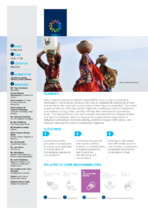This site is inactive as of February 2020. For updated information on an initiative's work, please refer to their own website as listed in their contact details.
Summary
Many religious institutions and faith-based NGOs (FBOs) have a unique comparative advantage in humanitarian contexts: they have an established relationship of trust and familiarity with local communities in which they are embedded. Due to their presence before a crisis they are often the first responders and key providers of assistance and protection during crises, and they will remain after international organizations leave. Utilizing their localized networks, resource mobilization, trust and influence with local communities and commitment to peace and dignity, they provide critical and sustainable contributions to all aspects of humanitarian response as well as subsequent development needs.
The Charter for Faith-Based Humanitarian Action was endorsed at the World Humanitarian Summit by more than 160 faith-based actors (FBOs and religious Leaders), representing all major faith traditions and different geographical regions. The charter presents concrete commitments from religious leaders and other humanitarian actors to increase the impact of faith-based actors in reducing humanitarian need and suffering, and to call for their inclusion within policy- and decision-making at all levels of humanitarian response.
Partners
Over 150 faith-based humanitarian actors from all religious traditions and regions of the world were party to the development and launch of the Charter.

Goals
Faith-based entities commit to:
- Upholding the principles of compassion, humanity and impartiality in their provision of humanitarian assistance and protection in alignment with fundamental humanitarian principles.
- Upholding and expanding the significant humanitarian response of faith-based organizations and to overcome the manipulative and abusive attempts to link religion with violence, terrorism, or exclusion of others.
- Working together to better contextualize humanitarian response, leveraging their added value to reach people in need of assistance and protection, and using their influence to mobilize local communities in support of these efforts.
- Bringing their intimate knowledge of community needs, practices, fears, and hopes to humanitarian work, to keep affected persons at the center of all assistance planned and provided, maintaining robust beneficiary feedback mechanisms and to ensure that women and girls’ rights are protected, their needs are met, and that their ability to engage in decision making is enhanced.
- Facilitating spiritual assistance which can significantly contribute to the population’s sense of hope during and after a disaster, while prohibiting pressuring people into any religious practice and continuing to work with national governments to recognize and affirm the role of faith and faith based organisations to provide faith-based assistance to communities in need.
Resources





 summary
summary partners
partners goals
goals Stakeholder reports
Stakeholder reports resources
resources contacts
contacts